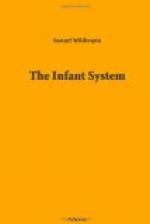Our mother, next, had she but seen
Her gifts of kindness so employ’d,
Would she not JAMES, well pleased have been;
And all my feelings then enjoy’d?
The poor old man, was he not pleased?
Must not his load of sorrow be,
Though but for one short moment, eased,
To think, ‘Then some one feels for me.’
But still you ask, of all this pleasure,
How much will to the giver fall?
The whole, rich, undiminish’d treasure,—
He feels, he shares the joy of all.
We eat the cake, and it is gone;
What have we left to think upon?
Who’s pleased by what we then have done?
How many pray, JAMES, more than one?
The joys by sympathy supplied
Are many, great, and dignified.
But do not on my word rely,
Whilst you, dear JAMES, the fact may try;
And if you do not find it true,
I’ll next time eat both halves with you!”
* * * * *
It is desirable that the master should add instrumental to vocal music. He should be able to play on the violin, flute, or clarionet, but, as he must speak much, the former is to be preferred. Such is the influence of the weather, that children are almost always dull on dull days, and then a little music is of great advantage. On wet days, when they cannot go into the play-ground, it assists them in keeping the step when they march, it cheers and animates their spirits, and, in some measure, compensates for their privations. It will also aid various evolutions.
Music may be employed, moreover, to soften the feelings, curb the passions, and improve the temper, and it is strange that it should not have been employed till the operation of the Infant System, to which it is absolutely indispensable. When, for instance, after a trial by jury, as explained in a former page, the children have been disposed to harshness and severity, a soft and plaintive melody has produced a different decision. To recite one case; when I was organizing the Dry-gate School in Glasgow[A], a little girl in the gallery had lost of her ear-rings (which, by the way, like beads, is a very improper appendage, and ought by all means to be discouraged), and on discovering the fact, commenced a most piteous lamentation. I made inquiry for it immediately, while the children were seated in the gallery, but in vain; and I subsequently found it in the hands of a little girl at the bottom, who was attentively examining it, and who gave it me the moment it was demanded. On asking the children what was to be done in this case, they said she should have a pat of the hand. I then showed, that had she intended to steal it, she would have secreted it, which she did not, and that her attention was so absorbed by it, that she had not heard my inquiry; but one little boy was not satisfied; he said, “She kenned right weel it was nae her ain;” but after singing a simple and touching air, I was pleased to find his opinion changed. “Perhaps, sir,” he said, “ye may as weel forgie her this ance, as she is but a wee thing.”




